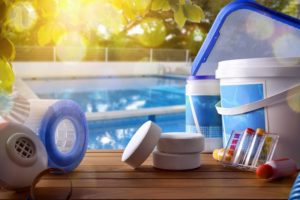
Read on to understand the importance of chlorine in swimming pools.
Without modern chemistry, most of our fun backyard swimming pools would be a germ-filled petri dish. Even a quick swim in unsanitized water can expose swimmers to various illnesses and skin infections, so maintaining your swimming pool with chemicals like chlorine is essential for healthy, enjoyable dips in the pool. However, when people hear the term “chemicals,” they often think of harsh, potentially dangerous liquids. But the chemicals used in swimming pools are used safely to eliminate the microbes that cause illnesses. So what exactly does chlorine do to keep you safe, and are there any consequences of using it? Read on to find out the details of using chlorine in swimming pools.
Why is Chlorine Added to Swimming Pools?
Chlorine in swimming pools is used as a sanitizer and is added to kill germs. When added to a pool, chlorine forms a weak acid called hypochlorous acid that kills bacteria, including salmonella and E. coli, as well as various other germs that can cause viruses.
How is Pool Water Chlorinated?
Pools are sanitized by the use of a variety of chlorine-based compounds like chlorine gas, sodium hypochlorite or “liquid bleach,” calcium hypochlorite, lithium hypochlorite, and chlorinated isocyanurates. When these compounds contact the water, they release hypochlorous acid, which is the active sanitizing agent.
What About Salt Water Pools?
Saltwater pools and chlorinated pools both use chlorine. However, saltwater pools are chlorinated pools in which the chlorine is generated from sodium chloride. Other types of pools use chlorine to disinfect the water with chlorine tablets or sticks.
Why Do Pools Have a Chlorine Smell?
Healthy pools shouldn’t smell like chemicals. Pool water is often said to “smell like chlorine,” but a well-managed pool shouldn’t have a perceptible odor. This pool water scent we know is not from the chlorine in swimming pools but instead from chemical compounds called chloramines. These chloramines can build up in pool water when the water is improperly treated. Chloramines are formed from the combination of the chlorine disinfectants and sweat, oils, or other bodily fluids from swimmers.
Does Chlorine in Swimming Pools Irritate Swimmers’ Eyes?
If, after a swim, a swimmer’s eyes are reddened or irritated, that is often a sign that a swimming pool is not chlorinated enough. To keep a pool safe, the water must be tested regularly, particularly when it is being used a lot. Chlorine in swimming pools is there to help swimmers and keep us germ-free. Without it, our summertime swims would be very different.
Admiral Pools is Your Complete Swimming Pool Resource
Admiral Pools LLC is a multi-faceted company involved in the construction and renovation of all types of in-ground swimming pools, serving Baltimore, Harford, and Cecil Counties of Maryland and Southern Pennsylvania. Admiral Pools does the vast majority of our work with in-house personnel, and we pride ourselves on being a turnkey operation that provides retaining walls, hardscaping, fencing, and outdoor lighting. Customers can visit our retail location and showroom in Abingdon, MD, to purchase pool chemicals, as well as above-ground pools, spas, parts, maintenance equipment, pool games, and toys. Admiral Pools of Maryland is dedicated to providing our customers with the highest quality swimming pools, the best service, and a complete selection of parts and chemicals the retail industry has to offer. Contact Admiral Pool’s representative through our website today to receive your free quote, or call us at 1-866-297-POOL (7665). Follow us on Facebook, Instagram, LinkedIn, Twitter, and Pinterest for all of the latest updates and news in the recreational water industry.




